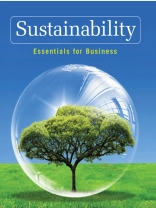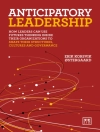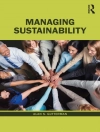The first survey text of its kind to provide a comprehensive treatment of the relationship between business and sustainability,
Sustainability: Essentials for Business gives students a thorough understanding of the complex interaction between the needs of society versus the ecological limits on natural resources. Part I provides readers with a foundation for developing a clear understanding of the major issues confronting our natural resources, such as wasted resources and polluted environments. Part II,
Renewable Resources, discusses natural resources such as air, water, forests, soil, biodiversity, and energy to provide students with a starting point so that the later chapters on environmental challenges can be framed within an appropriate context. Part III,
Stakeholder Interest and Choices, presents stakeholder perspectives such as the role of consumers, the role of corporations, and the role of governments and NGOs. This section also includes a comprehensive discussion of strategies and frameworks used to understand and implement sustainability. Part IV,
Strategies for a Sustainable Future, presents chapters on reporting and measurement, carbon markets, the design of sustainable cities, and green marketing. This must-read text focuses on the three 'Ps’: planet, people, and profit.
Spis treści
I. SUSTAINABILITY–ESSENTIALS FOR BUSINESS
Introduction
II. RENEWABLE RESOURCES
1. Air and Climate Issues
2. Water Issues
3. Sustainable Agriculture and Food
4. Forests, Wildlife, and Biodiversity
5. Alternative Clean Energy and Fuels
III. STAKEHOLDER INTEREST AND CHOICES
6. Sustainability Strategies and Frameworks
7. Role of the Consumer
8. Role of the Corporation
9. Role of Governments and Nongovernmental Organizations
IV. STRATEGIES FOR A SUSTAINABLE FUTURE
10. Transparent Reporting, Measurement, and Metrics
11. Carbon Markets: Offsets and Standards
12. Designing Sustainable Cities and Communities
13. Green Marketing
O autorze
Kanwalroop Kathy Dhanda is Associate Professor in the Department of Management, Dreihaus College of Business at De Paul University. Previously, Kathy was an Assistant Professor in the School of Business Administration at the University of Portland, Oregon where she was awarded the Outstanding Graduate Professor Award and the Pamplin Fellow Award. She is also an invited professor at AUT University in New Zealand, American University in Paris, and the Aalto University, Finland.Kathy′s academic scholarship focuses on sustainability issues with a primary emphasis in the areas of environmental modelling, carbon markets, emissions trading, corporate social responsibility and reverse logistics. She has been published in Operations Research, Journal of Business Ethics, Academy of Management Perspectives, Energy Economics, Journal of Public Policy and Marketing Policy Watch, Organization & Environment, Journal of Environmental Economics and Management, as well as other journals. She is also the co-author of Environmental Networks: A Framework for Economic Decision-Making and Policy Analysis (Edward Elgar).Kathy graduated cum laude from Angelo State University and received her doctorate degree in Management Science from the University of Massachusetts at Amherst. She lives in northern suburbs of Chicago with her husband, Adrian, and her two children, Arman and Ariana. She loves to read, travel and cook spicy food.












